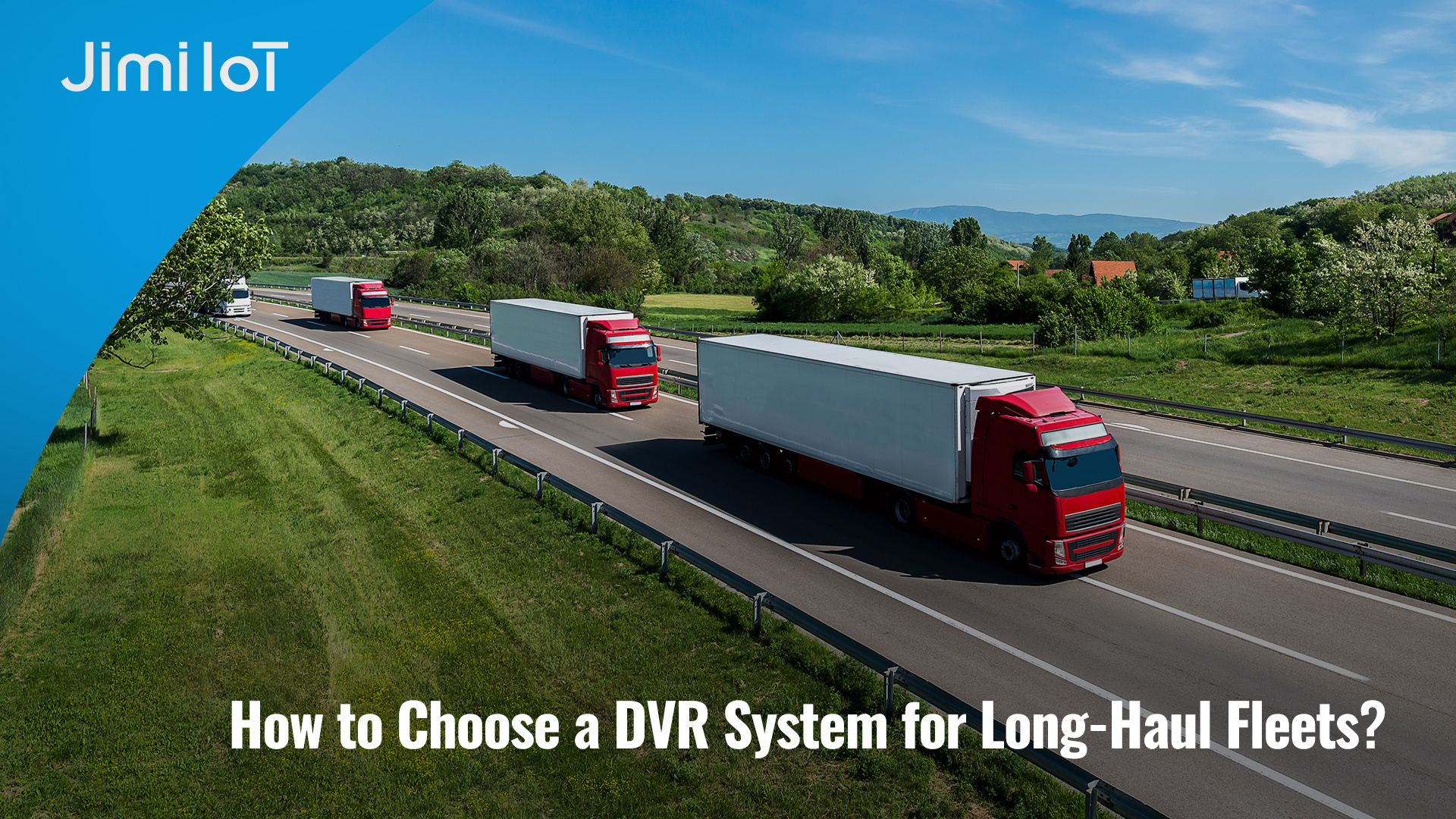Introduction
Cross-border trucking is the lifeline of international trade, enabling the seamless movement of goods across national boundaries. As a fleet manager or logistics professional, you know that the efficient, secure, and compliant transportation of cargo is not only vital to your business’s bottom line but also to maintaining strong relationships with trading partners. In today’s challenging environment, GPS tracking technology has emerged as an indispensable tool for addressing many of the critical concerns that fleet operators face on a daily basis.

Optimizing Routes for On-Time Deliveries
One of the most pressing issues for operators engaged in cross-border freight is ensuring timely deliveries. Delays can disrupt supply chains, lead to increased costs, and damage customer trust. GPS technology offers real-time location updates that empower fleet managers to optimize routes dynamically. With precise, up-to-the-minute tracking data, you can avoid congested routes, road closures, or areas known for heavy border traffic. This not only improves delivery times but also helps in reducing fuel consumption and overall operating costs.
For example, if a shipment is approaching a busy border crossing, real-time data can alert you to potential bottlenecks. This allows you to proactively reassign routes or adjust schedules, ensuring that your vehicles maintain a steady pace. In doing so, you not only meet the expectations of your clients but also enhance the efficiency of your operations—a key factor in today’s competitive marketplace.
Ensuring Compliance with Customs and Regulatory Requirements
Navigating the complexities of customs regulations is a major challenge for cross-border transportation. Inadequate documentation or deviations from approved routes can result in delays, fines, or even the seizure of cargo. Advanced GPS systems provide a detailed, verifiable record of every journey. This data is invaluable during customs inspections, as it demonstrates that vehicles have adhered to the established transit corridors and regulatory requirements.
Consider the scenario where your shipment is held up at customs due to discrepancies in its declared route. With GPS tracking, you can provide officials with clear evidence of the vehicle’s path, helping to resolve any misunderstandings quickly. Moreover, some systems integrate with electronic logging devices (ELDs) to automate the collection and submission of compliance data, minimizing manual errors and streamlining the entire customs clearance process. For a fleet manager, this level of transparency and accuracy is critical to maintaining uninterrupted cross-border operations.
Enhancing Cargo Security and Preventing Theft
Cargo security remains a top concern for any operation that involves moving high-value goods. Theft not only results in direct financial losses but also disrupts schedules and increases insurance premiums. Modern GPS tracking devices offer real-time monitoring that is essential for preventing theft and recovering stolen assets.
Through features such as geofencing, you can establish virtual boundaries for your vehicles. If a truck deviates from its designated route or leaves a predefined area, the system triggers an immediate alert. This rapid notification allows you to take swift action, such as contacting local authorities or instructing the driver to verify the situation. Additionally, the continuous tracking data provided by these devices serves as a deterrent against potential thieves who know that their movements are being monitored in real time.
The effectiveness of this technology is particularly evident in areas with high theft rates. By having reliable GPS tracking, fleet operators can quickly pinpoint the location of a vehicle, facilitating faster recovery and minimizing the downtime associated with theft. This, in turn, helps maintain customer satisfaction and preserves the integrity of your supply chain.
Improving Operational Efficiency and Cost Control
Operational efficiency is a cornerstone of successful fleet management. As a manager, you are constantly seeking ways to reduce costs while maximizing productivity. GPS tracking systems offer detailed insights into vehicle performance and driving behavior, enabling you to optimize every aspect of your operation.
For instance, advanced telematics integrated with GPS trackers can monitor driving behavior—such as speeding, harsh braking, and rapid acceleration. This data allows you to identify patterns that may lead to increased fuel consumption or wear and tear on your vehicles. By addressing these issues through targeted driver training or adjusting routes, you can achieve significant cost savings over time.
Furthermore, the data collected by GPS devices provides a wealth of information that can be used to schedule preventative maintenance more effectively. Instead of relying on fixed maintenance schedules, you can use real-time performance data to anticipate potential issues before they become costly repairs. This proactive approach minimizes vehicle downtime and extends the lifespan of your fleet, resulting in improved operational efficiency and reduced overall costs.
Enhancing Decision-Making with Real-Time Data
In the fast-paced world of international logistics, having access to real-time data is critical for making informed decisions. GPS tracking systems enable fleet managers to monitor every aspect of their operations from a centralized dashboard. This level of visibility means that you can quickly assess the status of your vehicles, identify potential delays, and implement contingency plans as needed.
Real-time data also plays a vital role in optimizing resource allocation. For example, by analyzing GPS tracking reports, you can determine which routes are most efficient, identify areas where vehicles are frequently idle, and adjust your scheduling accordingly. This analytical capability ensures that your fleet is operating at peak efficiency, translating into better service levels and lower operational costs.
Moreover, the integration of GPS with other telematics solutions—such as electronic logging devices and onboard diagnostics—creates a comprehensive view of your fleet’s performance. This holistic approach allows you to identify trends, forecast future needs, and implement strategies that drive long-term improvements in both safety and efficiency.
Overcoming Challenges in Cross-Border Transportation
Cross-border trucking is fraught with challenges that can impede smooth operations. One major obstacle is the complexity of customs procedures and regulatory compliance. GPS technology mitigates these issues by providing a detailed log of vehicle movements. This record is crucial when addressing questions from customs officials, as it verifies that your vehicles have followed the prescribed routes and complied with all relevant regulations.
Another challenge is the risk of cargo theft and vehicle tampering. With GPS tracking, any deviation from planned routes is immediately detected, allowing for rapid intervention. For example, if a vehicle is unexpectedly rerouted or shows signs of tampering, alerts are sent instantly to fleet managers. This quick response capability is essential in minimizing the risk of theft and ensuring that cargo reaches its destination safely.
In addition to these security concerns, operating across borders requires navigating different legal and regulatory environments. By leveraging GPS tracking data, fleet managers can better understand and adhere to the varying regulations in different regions. This compliance not only prevents delays and fines but also builds trust with regulatory authorities and trading partners.
The Impact of GPS on Cross-Border Trade and Economic Growth
The significance of GPS technology in cross-border trucking extends beyond individual fleet operations. According to the American Truckers Association, over 25,000 truck crossings occur daily along the Southern border between the United States and Mexico, facilitating the transportation of goods valued at over $1.1 billion each day. This massive movement of freight is critical to international trade and economic growth.
Reliable GPS tracking ensures that these high-volume operations run smoothly. By enhancing route optimization, improving security, and ensuring regulatory compliance, GPS devices enable the efficient movement of goods across borders. This efficiency not only benefits individual companies but also contributes to the broader economy by supporting trade, reducing waste, and promoting sustainable practices.
A Strategic Investment for the Future
For fleet managers and logistics professionals, investing in advanced GPS tracking technology is not merely an operational upgrade—it is a strategic necessity. The challenges of cross-border transportation are multifaceted, encompassing regulatory hurdles, security risks, and the constant need for efficiency. GPS tracking systems address these issues comprehensively, offering a robust solution that ensures the smooth, secure, and cost-effective movement of goods.
As international trade continues to expand and the global market becomes increasingly competitive, the role of GPS in cross-border trucking will only grow in importance. By integrating reliable, real-time tracking solutions into your operations, you can safeguard your assets, optimize your routes, and ultimately drive sustainable growth for your business.
Conclusion
From enhancing route efficiency and ensuring customs compliance to improving cargo security and reducing operational costs, GPS tracking technology is a cornerstone of modern cross-border trucking. For fleet operators, the benefits of adopting advanced GPS solutions are clear: they provide the real-time visibility, precise tracking, and actionable data needed to overcome the unique challenges of international logistics.
By investing in robust GPS tracking systems, you can transform your fleet operations, mitigate risks, and maintain a competitive edge in today’s fast-paced trade environment. Embracing these technological advancements is not just about keeping pace with industry trends—it is about setting the foundation for long-term success and economic resilience in a globally interconnected market.
For more detailed information on how GPS tracking can revolutionize your cross-border operations and address your most pressing challenges, please contact us today.
Why JimiIoT
JimiIoT is a global leader in innovative IoT solutions. We provide cutting-edge hardware and software tailored to enhance efficiency and connectivity. Our range of products includes advanced GPS tracking devices, asset management solutions, smart vehicle dashcams, and telematics platforms. With a focus on technological excellence and customer satisfaction, we empower businesses to optimize operations and gain valuable insights from data-driven analytics. Trust JimiIoT to drive positive change and unlock growth opportunities in the digital age.
If you would like more details, please visit Facebook, LinkedIn, INS, and Twitter pages for further information.
 US
US ES
ES PT
PT TH
TH VN
VN JP
JP



